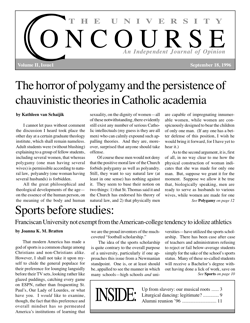Can charismatics and traditionalists peacefully coexist?
by Kathleen van Schaijik
No one who has been familiar with Franciscan University for a number of years would deny that cultural “conservatism” is gaining influence in her midst.
Some see this as a clear advance: the University is maturing in her Catholic identity; she is becoming more serious, more respectable—shedding her embarrassing association with the charismatic renewal. Her intellectual emphasis is more pronounced; her religious services more sober. The old hymns are making a comeback; Latin is being introduced.
Others fear she is slipping off the straight and narrow. Her priorities are shifting; she used to “seek first the Kingdom of God,” now she is preoccupied with academic ambition. Where students once rejoiced freely in worship services, now they fret over the rubric and insist rudely on liturgical correctness; they used to be docile, eager to submit to the wisdom of the friars, now they are arrogant, critical, complaining.
Both these views have some merit, but each is incomplete, and if allowed to prevail unchecked and unrefined, will go far toward undermining the unique greatness of this University.
No doubt the old “charismatic” element is sorely tempted to resent the waxing influence of “traditionalists,” and view it as an entirely negative development in the life of our institution. Besides the fact that they are generally new-comers who are out-of-touch with the “salvation history” of Franciscan University, traditionalists are typically articulate and very self-assured; they quickly gain sway over especially a certain type of student—one whose tendency is to intellectualize his faith and whose temptation is to “lord it over” others—priests, professors and fellow students alike. And by its heavy emphasis on the importance of objective truth (as opposed to religious experience or subjective appropriation of truth) cultural conservatism sometimes encourages people to substitute “traditionalism” or “knowledge of Church teaching” for authentic religious devotion. When this happens, a spirit of pride and contention replaces the one of unity-in-love which is the sine qua non of any genuine Christian community. And on our campus, it goes a long way toward undoing the fruitful efforts of the “charismatics” over the last two decades in establishing the priority of personal faith in Jesus Christ and fostering an atmosphere of freedom and joy among the student body.
It is easy for those who have long been devoted to this University and its characteristic way of being to wish the arch-conservatives would go away and leave FUS alone. (Wouldn’t they be more at home at Christendom or Thomas Aquinas or Magdalene College? Must they dominate every institution which wants to be faithful to the Magisterium?) It is likewise easy for them to begin to identify conservatism with its defects—with everything that is arrogant, rigid and hopelessly ignorant of what really makes this place tick.
But in this, not only do they do an injustice to most individual traditionalists, but they alienate very powerful allies in the ongoing battle to become all that we are called to be. The strengths of Catholic conservatism—its rootedness in the tradition, its commitment to truth, its appreciation of the life of the mind, its love of beauty—provide a marvelous complement to the charismatic emphasis on personal experience and affectivity. The influence of conservatism can ground, deepen, focus and stabilize the mission of the University—keep us from going the sorry way of so many charismatic communities and prayer groups, who in recent years have dissolved to nothingness or drifted into sheer subjectivism and emotivism.
Similarly, let conservatives not be so quick to suppose that they improve the University by dissociating it from the charismatic renewal. It is in large measure the renewal that has made her the extraordinary thing that she is—a place teeming with young adults on fire for God and eager to give their lives in service of the Church.
A few years back I heard an eminent, erudite bishop (whom conservatives would immediately recognize as one of their own) say—what I have often mulled over since—“The charismatic renewal saved me from intellectual pride.”
Let us stop contending with one another; be humbly grateful for the gifts others have to offer, and thank God that His wisdom surpasses ours.
Kathleen van Schaijik


